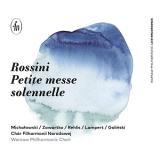Petite messe solennelle – Rossinis Alterssünde, wie er sein spätes Werk liebevoll ironisch nannte – stellt schon durch ihren Titel die Interpreten vor Probleme. Es ist keine kleine Messe, keine Missa brevis, sondern eine umfängliche Vertonung des lateinischen Messtextes. Klein bezieht sich auf die ursprüngliche Besetzung mit 12 Sängern – 8 Choristen und 4 Solisten, die der Warsaw Philharmonic Choir locker überschreitet. Dennoch gelingt es Dirigent Bartosz Michalowski wie selbstverständlich den intimen Charakter des Werkes zu unterstreichen.
Damit wären wir auch schon beim zweiten Problemwort – solennelle. Große Feierlichkeiten gibt es in dieser Interpretation kaum, keine opernhafte Gestik, wie man sie beim Bühnenmusiker Rossini erwarten darf. Dafür sorgt vor allem das exzellent untereinander abgestimmte Solistenquartett, das sich bei Anflügen von Theatralik in der Musik zurücknimmt, und den geistlichen Charakter des Werkes klar in den Mittelpunkt stellt.
So erleben wir eine unaffektierte, eher introvertierte Interpretation dieses spannenden Werkes, der die Rossinische Leichtfüßigkeit (Fugen im Gloria- und Credo) nicht abgeht, die aber vor allem die spirituelle Tiefe der Musik sucht und findet.
Petite messe solennelle – Rossini’s sin of old age, as he affectionately and ironically called his late work – already poses problems for performers by its title. It is not a small mass, a missa brevis, but a full-scale setting of the Latin text of the mass. ‘Petite’ refers to the original scoring of 12 singers – 8 choristers and 4 soloists, which the Warsaw Philharmonic Choir easily exceeds. Nevertheless, conductor Bartosz Michalowski succeeds as a matter of course in emphasizing the intimate character of the work.
This brings us to the second problem word – solennelle. There are hardly any grand celebrations in this interpretation, no operatic gestures as one might expect from Rossini the stage musician. This is ensured above all by the excellently coordinated quartet of soloists, who restrain themselves from hints of theatricality in the music, and clearly focus on the spiritual character of the work.
Thus we experience an unaffected, rather introverted interpretation of this exciting work, which does not lack the Rossinian lightness (fugues in the Gloria and Credo), but which above all seeks and finds the spiritual depth of the music.






















